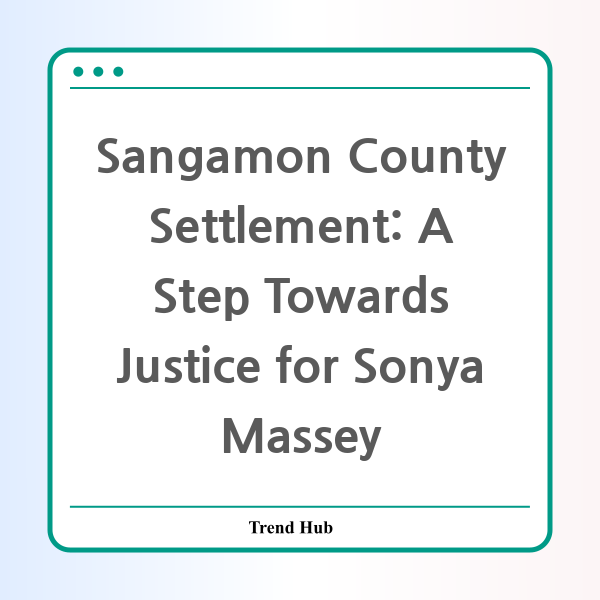* This website participates in the Amazon Affiliate Program and earns from qualifying purchases.

In a poignant example of ongoing struggles with police accountability, Sangamon County, Illinois, has agreed to pay a $10 million settlement to the family of Sonya Massey, a Black woman who tragically lost her life during a police response in her home. This incident has drawn national attention, igniting conversations around systemic racism, police training, and mental health awareness in law enforcement practices.
On July 6, 2022, Sonya Massey called 911 seeking help for a suspected prowler outside her home—a call that turned fatal. Responding to her request for assistance, Deputy Sean Grayson, who is now facing charges of first-degree murder, shot Massey three times while she was holding a pot of boiling water. This horrifying action and the events leading up to it underline critical issues in police conduct, particularly regarding the treatment of individuals with mental health challenges.
The details surrounding the events of that day are troubling. As Massey attempted to comply with the deputy's instructions amidst a distressing situation, she expressed her fear and attempted to de-escalate the encounter. Tragically, instead of receiving the help she sought, she became a victim of police violence. This incident has sparked widespread outrage and protests, highlighting a troubling pattern of police violence against marginalized communities, especially when mental health issues are involved.
The $10 million settlement is a significant sum, marking one of the largest payouts for civil rights cases within Sangamon County's recent history. It aims to provide some financial relief to Massey's family, who are left to cope with the unimaginable loss of a mother and a daughter. However, as noted by civil rights attorney Ben Crump, this settlement represents just one step in a long journey toward justice, accountability, and systemic reform.
In the wake of this tragedy, the county has also taken steps to address the failures in its policing practices. County officials have pledged to invest in training for law enforcement aimed at enhancing de-escalation techniques, improving mental health responses, and promoting non-discriminatory policing. These organizational changes are crucial in rebuilding trust between law enforcement and the community, particularly in addressing the grievances and fears of marginalized groups.
Moreover, the case has prompted the establishment of a citizen's commission aimed at tackling systemic racism and improving access to equitable services. This commission's work will be vital in creating a supportive environment and ensuring that no family has to endure the pain that Sonya Massey's family has faced.
Sonya Massey’s tragic story serves as a mirror reflecting the urgent need for comprehensive reforms in policing practices across the United States. Her name joins a growing list of individuals whose lives were cut short by excessive force. As communities across the nation continue to advocate for change, the echoes of their pleas for justice resonate louder than ever.
As we remember Sonya Massey, we must also use her story as a catalyst for change—calling for greater accountability, improved training for law enforcement, and a commitment from all levels of government to prioritize the safety and well-being of all citizens. Moving forward, it will be imperative to turn this tragedy into actionable change that honors her memory and benefits future generations.
* This website participates in the Amazon Affiliate Program and earns from qualifying purchases.